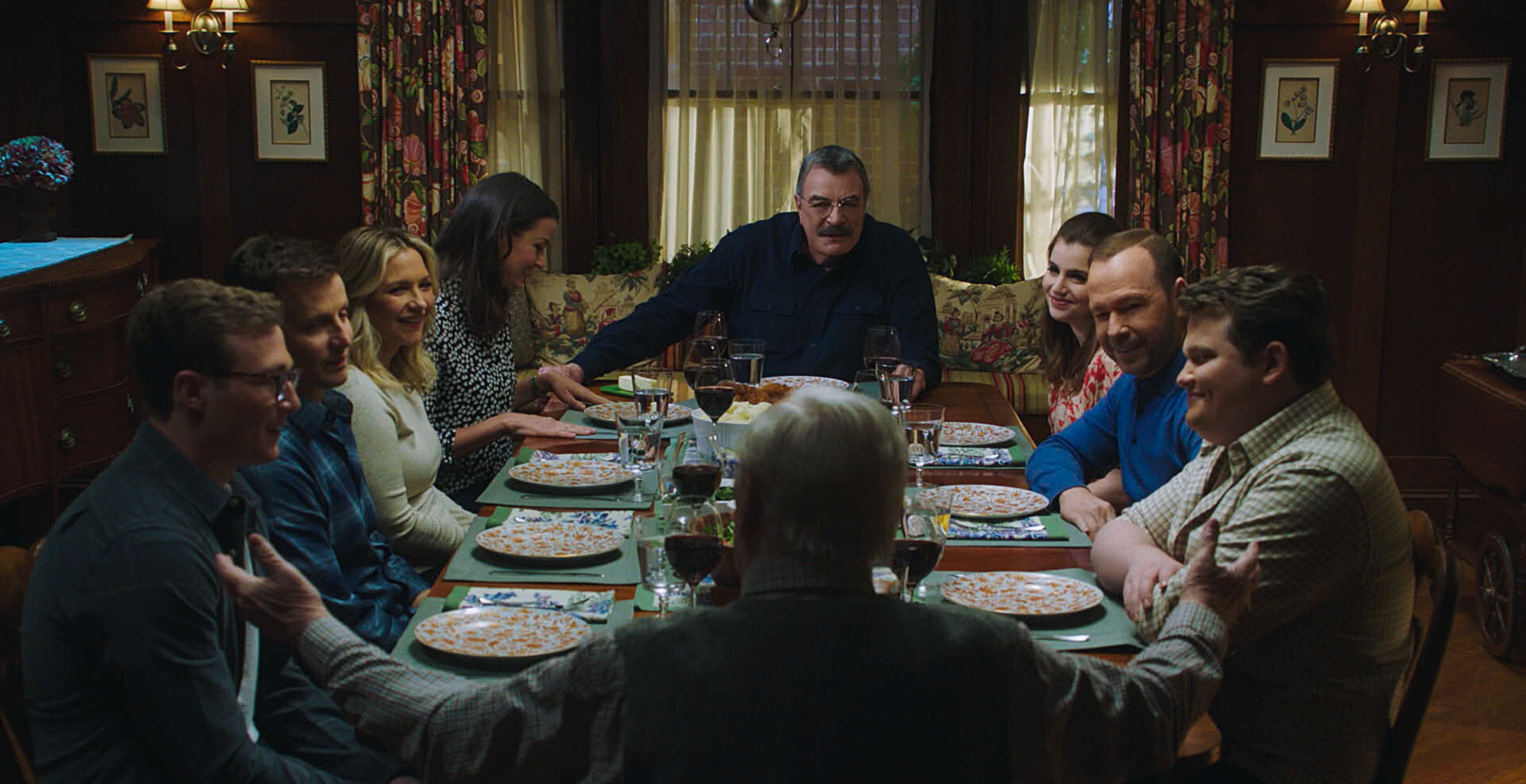Unraveling Blue Bloods: How Many Seasons Has The Reagan Family Ruled?
For over a decade, Friday nights have belonged to the Reagans, the fictional first family of New York City law enforcement, captivating millions of viewers with their blend of police procedural drama and compelling family dynamics. If you're a long-time fan or just discovering the show, a common question often arises: how many seasons Blue Bloods has graced our screens? This article will delve deep into the remarkable run of this beloved series, providing a definitive answer and exploring the factors that have contributed to its extraordinary longevity and enduring appeal.
From intense courtroom battles and gritty street investigations to the iconic Sunday family dinners, Blue Bloods has carved out a unique niche in television, proving that a show centered on family, duty, and justice can resonate across generations. Its consistent quality and dedicated fanbase have allowed it to achieve a milestone that few network dramas ever reach, making its journey a fascinating case study in television success.
Table of Contents
- The Enduring Appeal of Blue Bloods: A Television Phenomenon
- How Many Seasons Blue Bloods: The Definitive Count
- The Pillars of Success: Why Blue Bloods Endures
- Crafting Consistency: Writing, Direction, and Performance
- Cultural Resonance and Societal Impact
- Viewer Loyalty: The Unwavering Fanbase
- The Future of the Reagan Dynasty: What Lies Ahead?
- The Many Faces of Justice: A Look at the Core Cast
The Enduring Appeal of Blue Bloods: A Television Phenomenon
Since its premiere in September 2010, Blue Bloods has distinguished itself as a cornerstone of CBS's prime-time lineup. It's not just another police procedural; it's a multi-layered narrative that explores the complexities of law enforcement through the lens of a tightly-knit, albeit often conflicted, Irish-American family. The show stars Tom Selleck as Frank Reagan, the New York City Police Commissioner, with Donnie Wahlberg, Bridget Moynahan, Will Estes, and Len Cariou portraying his children and father, all deeply entrenched in various aspects of the legal and police systems. This unique blend of professional challenges and personal drama has been a magnet for audiences, drawing in many viewers week after week.
- Twitter Fred Guttenberg
- Rhea Perlman Children
- Tiffany Chen Robert De Niro
- Matilda Ledger
- %D0%B4%D0%B6%D0%B5%D0%BA%D0%BB%D1%96%D0%BD %D0%B1%D0%B5%D0%B7%D0%BE%D1%81
More Than Just a Police Procedural: The Heart of the Show
What sets Blue Bloods apart from many other crime dramas is its unwavering focus on family. The weekly Sunday dinner scenes, where the Reagans gather to discuss cases, ethics, and personal struggles, have become iconic. These moments provide a moral compass for the show, allowing for deep philosophical discussions about justice, loyalty, and the often blurry lines between right and wrong. It’s this consistent exploration of values, combined with compelling individual storylines for each family member, that has cultivated a loyal following. Many shows attempt to balance professional and personal lives, but few achieve it with the grace and depth seen in Blue Bloods.
How Many Seasons Blue Bloods: The Definitive Count
To answer the central question directly: Blue Bloods has concluded its 14th season as of the time of this writing. This remarkable achievement places it among the longest-running scripted dramas in television history, especially for a show that has maintained consistent viewership and critical relevance throughout its run. The show's journey began in 2010, and it has consistently delivered new episodes each fall season, building a vast library of stories and character development. The question of "how many seasons Blue Bloods" has aired is a testament to its longevity and the enduring connection viewers have with the Reagan family.
A Legacy of Longevity: Tracing the Reagan Saga
Each season of Blue Bloods typically comprises between 20 and 22 episodes, meaning that over the years, many hundreds of hours of content have been produced. This extensive catalog allows for deep dives into various aspects of law enforcement, from precinct-level police work to high-stakes political maneuvering within the NYPD. The show has successfully navigated evolving social landscapes, maintaining its core values while addressing contemporary issues, which is a significant factor in its ability to sustain interest across so many seasons. It's a testament to the show's adaptability and its commitment to exploring relevant themes.
Blue Bloods Seasons at a Glance
| Season | Premiere Date | Finale Date | Episode Count |
|---|---|---|---|
| 1 | Sep 24, 2010 | May 13, 2011 | 22 |
| 2 | Sep 23, 2011 | May 11, 2012 | 22 |
| 3 | Sep 28, 2012 | May 10, 2013 | 23 |
| 4 | Sep 27, 2013 | May 9, 2014 | 22 |
| 5 | Sep 26, 2014 | May 1, 2015 | 22 |
| 6 | Sep 25, 2015 | May 6, 2016 | 22 |
| 7 | Sep 23, 2016 | May 5, 2017 | 22 |
| 8 | Sep 29, 2017 | May 11, 2018 | 22 |
| 9 | Sep 28, 2018 | May 10, 2019 | 22 |
| 10 | Sep 27, 2019 | May 8, 2020 | 19 |
| 11 | Dec 4, 2020 | May 14, 2021 | 16 |
| 12 | Oct 1, 2021 | May 6, 2022 | 20 |
| 13 | Oct 7, 2022 | May 19, 2023 | 21 |
| 14 | Feb 16, 2024 | May 17, 2024 | 18 (Split into two parts) |
*Note: Season 10 and 11 had fewer episodes due to production impacts, primarily related to the COVID-19 pandemic. Season 14 is airing in two parts, with the second part expected in Fall 2024.
The Pillars of Success: Why Blue Bloods Endures
The question of how many seasons Blue Bloods has achieved naturally leads to another: why has it lasted so long? Several key factors contribute to its enduring success. Firstly, its consistent Friday night slot has allowed it to build a dedicated audience who know exactly when and where to find their weekly dose of Reagan family drama. Secondly, the show has masterfully balanced standalone procedural cases with overarching family storylines, keeping the narrative fresh while maintaining its core identity. Many shows struggle to maintain this balance over time, but Blue Bloods has done so with remarkable consistency.
The Power of Family: Character Dynamics and Relatability
At its heart, Blue Bloods is a family drama. The dynamic between Frank, Danny, Erin, Jamie, and Henry provides a rich tapestry of perspectives on justice and morality. Viewers connect with the characters' struggles, triumphs, and ethical dilemmas. The show doesn't shy away from depicting the personal sacrifices and emotional toll of a life in law enforcement, making the characters relatable and their stories compelling. This deep character development, spanning many years, has allowed the audience to truly grow with the Reagans, investing in their individual journeys and collective bond.
Crafting Consistency: Writing, Direction, and Performance
The sustained quality of Blue Bloods across so many seasons is a testament to the dedication of its creative team. The writing remains sharp, crafting engaging cases that often mirror real-world issues, while ensuring the family dynamics evolve naturally. The direction consistently delivers a polished, cinematic feel, enhancing the gritty realism of New York City. Crucially, the performances from the core cast, led by the gravitas of Tom Selleck, have remained exceptional. Their ability to embody their characters with depth and nuance has been a critical component of the show's appeal, allowing it to navigate many complex storylines without losing its footing.
Cultural Resonance and Societal Impact
Beyond its entertainment value, Blue Bloods has also played a role in cultural discourse. It often tackles sensitive and timely topics related to policing, civil liberties, and the justice system, prompting viewers to consider different perspectives. While it presents a largely sympathetic view of law enforcement, it doesn't shy away from internal conflicts and the moral ambiguities inherent in the profession. The show's longevity means it has had the opportunity to reflect and respond to many societal changes and ongoing debates, making it more than just escapism but also a mirror to contemporary issues. Its consistent presence on television for so many seasons has allowed it to become a part of the cultural fabric for many households.
Viewer Loyalty: The Unwavering Fanbase
The true measure of a show's success over many seasons is its ability to retain its audience. Blue Bloods boasts one of the most loyal fanbases in network television. Its consistent viewership numbers, particularly in the coveted Friday night slot, demonstrate a deep connection between the show and its audience. Fans appreciate the predictable yet comforting structure of the episodes, the strong moral compass of the Reagan family, and the nuanced performances. This unwavering loyalty has been instrumental in securing its many renewals, allowing the narrative to unfold over more than a decade. Many viewers consider it a weekly ritual, a testament to its consistent quality and engaging storytelling.
The Future of the Reagan Dynasty: What Lies Ahead?
As of its 14th season, it has been announced that this will be the final chapter for Blue Bloods. The season is being split into two parts, with the first part having concluded in May 2024 and the second part expected to air in Fall 2024. This decision, while bittersweet for many fans who have followed the Reagans for so many years, allows the creators to craft a fitting conclusion to a remarkable run. It provides an opportunity to tie up loose ends, give proper send-offs to beloved characters, and ensure the legacy of the show is cemented in television history. The anticipation for the final episodes is high, as viewers eagerly await to see how the Reagan family's story concludes after more than a decade on air.
The Many Faces of Justice: A Look at the Core Cast
The longevity of Blue Bloods is inextricably linked to its phenomenal cast, whose dedication and talent have brought the Reagan family to life for so many years. Each actor has contributed significantly to the show's depth and appeal:
- Tom Selleck as Frank Reagan: The patriarch and NYPD Commissioner, Selleck brings a commanding yet compassionate presence, embodying the moral backbone of the show. His nuanced portrayal of a leader grappling with difficult decisions has been a consistent highlight across all the seasons.
- Donnie Wahlberg as Danny Reagan: A seasoned detective, Danny's hot-headed but effective approach to justice provides much of the show's procedural action. Wahlberg's dynamic performance has kept his character engaging through many personal and professional challenges.
- Bridget Moynahan as Erin Reagan: The Assistant District Attorney, Erin represents the legal arm of the family, often clashing with her brothers' police methods. Moynahan delivers a strong, intelligent portrayal, navigating the complexities of the justice system.
- Will Estes as Jamie Reagan: Starting as a beat cop and rising through the ranks, Jamie's journey reflects the everyday realities of police work. Estes brings a grounded and earnest quality to the youngest Reagan sibling.
- Len Cariou as Henry Reagan: The retired Police Commissioner and family elder, Henry provides wisdom, historical context, and often a much-needed dose of humor. Cariou's performance adds gravitas and warmth to the family dynamic.
The chemistry among these core actors, along with a strong supporting cast, has been a driving force behind the show's ability to captivate audiences for so many seasons. Their commitment to their roles has made the Reagans feel like a real family, inviting viewers to pull up a chair at their Sunday dinner table each week.
Conclusion
In

How—And Where—To Watch All 13 Seasons Of 'Blue Bloods'

All 13 Seasons of 'Blue Bloods,' Ranked From Worst to Best

Every Blue Bloods Season, Ranked Worst To Best